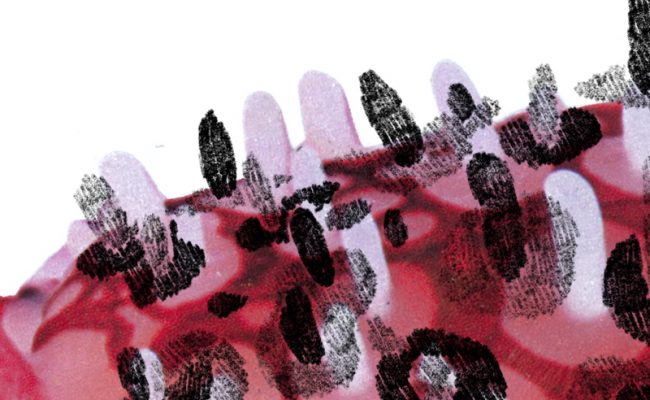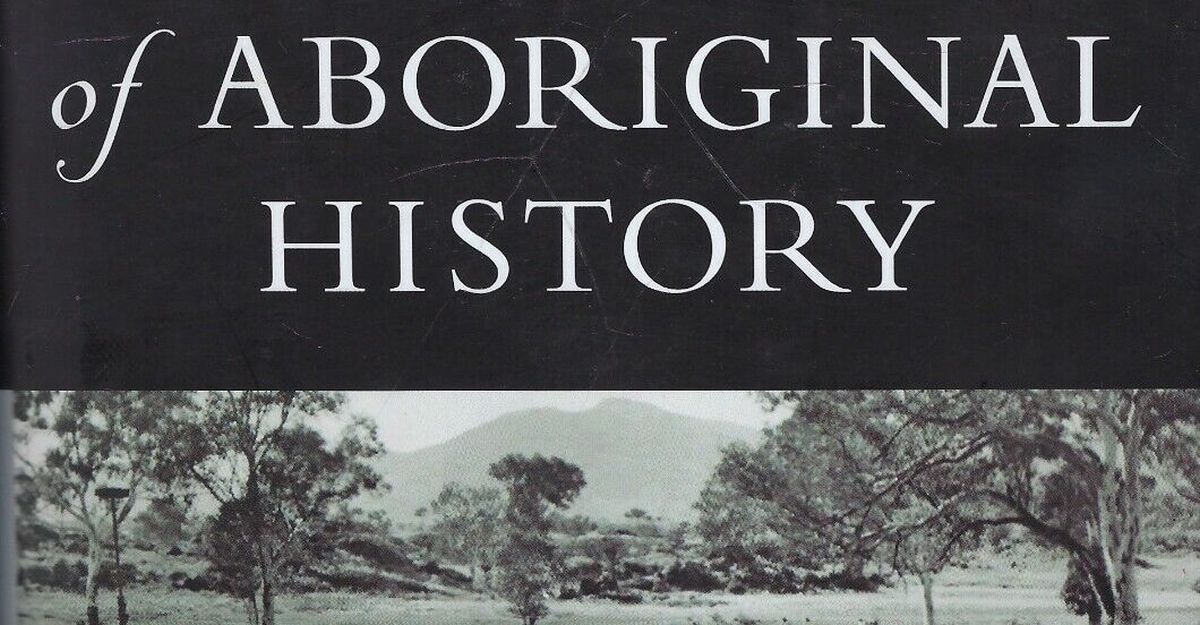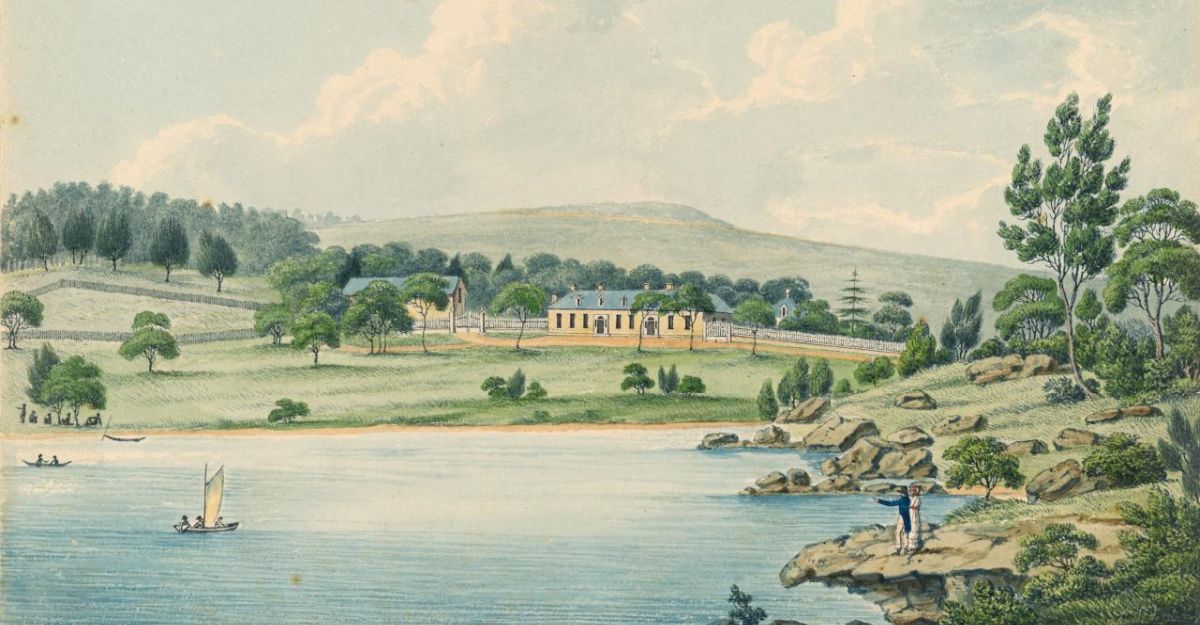Ghost gums creak like echoes in the slow opening dawn. After three hours propped against a tall eucalypt hiding in a nest of ferns, ass sore and somehow also numb, Nick tips his hat to the sun, the sign he’s been waiting hours for, hands burning with frost, toes damp in his boots that have seen better days. He picks up the rifle, pulls his body from the puddle of leaves. His left ankle throbs; he squeezes into the pain with cold fingers.
Nick tramps through dim undergrowth, eyes searching for a flick of something, a tail or ear dodging flies. Family of kookaburras, wing feathers dipped blue by the first rays of light, throw their heads back and laugh over him. Tree frogs start up from a cluster of dewy green elkhorns. Nick creeps past a pool of water cradled in mossed-over boulders, catching his reflection. He looks away.
The sky’s gaining colour; Nick has to be quick. Scanning ahead, he sees it — splodge of grey against a mash of saplings, fur tuft. Nick stalks forward, thinking of his daughter’s face: when he most needs to forget, Katya comes to him on the wind. Always, just before he makes a kill, he hears her young voice high up in the shimmer of branches and after last night, it turns his stomach. He swats away a March fly and shakes his head free of her. Now. Finger squeezes hard. Single bullet catches the jaw, blows it clean off. He bashes through thick undergrowth to get to the body. Standing over it, he sees the marsupial’s pouch undulate. A mother. Nick pulls the trigger again. Carrying her like a bag of cement sprawled over the wide slab of his shoulders, oozing down his back, buzz of blowflies sucking at orifices and blood, he feels movement where the pouch hugs his neck, a tremor. A small foot kicks.
The truck is full of kangaroos brought down by him and other shooters. Nick throws his carcass on the pile of bodies in the tray and slides into the passenger seat, pulling his hat low. The radio picks up a Rolling Stones track thick with static. No-one turns the dial for a clearer signal. They amble up the gorge, tyres bouncing, bodies thumping on metal in the back. The truck clears the forest finally, leans onto tarmac and the ride smoothes out. The driver thrums fingers on the wheel, whistles through the gap in his front teeth. At the petrol station in town, Nick jumps out.
‘Did you tag your roo?’ the driver asks.
Nick shakes his head. ‘I’m out of tags. You do it for me.’
‘What’s eating you, mate?’
‘It’s my girl. Sam’s kid told her. She knows.’
Mitch gobs in the dirt. ‘Mate, I’d tell her to harden-the-fuck-up.’
Nick reminds himself he’s known this face for twenty years. He waits for the truck to pull back onto the highway, watches dust rise on the road. Normally he’d get two pies from the servo and wolf them down but not this morning. Last night plays over in his head. Katya’s translucent eyes spilling tears down pale cheeks, how he tried to squirm out of it, how she nailed him on it in the end. Yes. I shoot things. Not shoot – you kill.
The house is dark and quiet inside. Nick sweeps damp hair off his face and looks through a crack in the blinds onto the ordinary suburban morning. In the shower he scrubs hard at the blood dried like scabs on his skin and his body is hot and stinging. His nostrils still carry the stench of forest, damp earth, mulch, wet fur. Ten am and the day has already had its way with him. He hopes he’s missed the guttural churn of garbage trucks but just in case he opens a bottle of whisky, big swigs straight down. Nick collapses on the couch. Turns on a replay game from the weekend. He’d hoped for a life like that, was half decent at it too before the accident. Falling asleep he hears animals foraging, spectres on the edge of his dreams. Blackened fur, writhing, worms in his mind.
Night. Nick’s frying sausages as the oven burns a tray of chips. He hears Jess come in. She sits at the table, rests her head on the scratched-up wood.
‘How was your day, baby?’
‘Jesus, Nick, what do you think?
He nods. Cracks open two rum cans. ‘Where’s Katya?’
‘At Mum’s.’
‘Right.’
They eat in silence. Charity shop cutlery slicing through greasy meat. She leaves the table before he’s finished eating. Later, he finds her in the laundry, scooping powder into the washing machine. Soon the heavy-duty cycle will run red from his clothes. He sees the look on her face, tries to ward off her tears,
‘We could make the most of the empty house?’
Jess glares at him, don’t touch me burning in her eyes.
‘She’ll be fine, she’s a kid.’ Nick goes to Jess, stops her busy hands, takes her in his arms. He breathes in her hair, how it smells sweet, mandarins, jasmine. Jess had carried Katya out of the house – away from him – the girl hysterical, sobbing so hard her body was shaking. They were learning about marsupials in school.
‘I told you she’d find out,’ Jess says.
Nick squeezes her closer. ‘I’ll fix it. I just need some time.’
Jess is stiff, arms by her side. She doesn’t say it, but he thinks it: this life of theirs, in every way, is his fault.
The alarm startles them into a new day. Jess kisses his cheek; he feigns sleep. She leaves to pick up Katya, drop their daughter at school, then head to work. Nick waits for the slam of the car door. In the kitchen sits a bowl of porridge left out for him, cold and congealed, but he eats it anyway with a slug of milk and a browning banana. Every day for months he’s gone back into the bush, gun loaded; today his bowels are running and he doesn’t have the strength. Death catches you if you’re not careful; you chase it till it swings around to fix its one beady eye on you. He’s seen it happen often around here. A guy necked himself. Another hits his wife. Those men over at the slaughterhouse—they can’t even think straight. This town grinds good men down.
Nick can’t go back to sleep; he’s too strung-out and his leg is cramping like his muscles are crawling with ants. He leaves the house. Walks through the yard of roses gone wild, past the broken tricycle, bones of their old dog under the banksia tree. Nick scowls at the neighbours’ yard, worse than theirs. Jess asked him to speak to the new people about their trash pile in the garden. He’d like to make her happy but as he surveys the weeping muck they’ve turfed onto their dead lawn, he knows he’ll say nothing.
He ambles through the streets to the edge of the forest—tallest gums around, graffiti on the National Parks sign, a waterfall melting to a trickle—and sees the metal hat of the silver beast glinting. There she is. He arrives at the water tower and slaps the base, looks up the steel ladder, puts his right foot on the bottom rung. Nick steps down, shakes his head. A ciggie would help but Jess made him quit. He spreads out his hands, rough, calloused, yesterday’s blood buried under nails. He sniffs his hands, don’t smell good. Nick backs away from the tower, remembering the feeling of standing right at the top. That night. Three of them, ripped on Jack Daniels and the flush of winning the finals. His two best mates, blurry figures ahead as he struggled to keep up. Cool autumn night, smell of bushfire. He was thinking of Jess as he ran, no shoes, feet cutting up on gravel; he didn’t care. In a few hours he’d sober up and go down on her in the back of her car. That night he was invincible, had wings. Soon he’d be on the bus to Melbourne, blue jersey with his name. They stopped, breathless, at the water tower, laughing. Nick fell against the side of it, shoulders crunched on metal. They hadn’t planned to end up here, it just happened after they got kicked out of the pub. Nick had enough sense to know he couldn’t turn up at Jess’s fully loaded so he’d mucked around with the team, boys tearing off as they headed home until there was just Mitch, Smith and him. They were giddy, they just ran.
‘Nicko!’ a voice from up high.
Nick looked up at Mitch, scaling the metal ladder to the top of the tower. He scrambled to get up there, feet slipping, head like cement. After, he would say he fell. He was climbing up the ladder and lost his grip. He secreted the truth and so did the boys, they knew it was all he had left. Nick crawled up the ladder to Mitch, who was clutching the rails and whooping into the night sky. They were winners. They were gods. They were men. The moon was bright. A breeze whipped through the forest. Nick saw a pinprick shooting star. Hell, he was a blazing comet.
‘Watch me, I can fly,’ he said.
Ten years ago now, all that time and it feels like a single drawn-out day, a bad trip that won’t end. Nick comes to a rock platform and looks over the valley. Summer’s been hot, real bad one this year. The bush is brown. Crisp. He crouches, picks at dead moss. A shot fires below. A flurry of rosellas streaks through the canopy. Nick follows the sound to a figure down in the ferns and shadows. He thinks of the mother he killed yesterday, the bullet he put in her brain. The second bullet he fired into her guts. Nick bolts, boots rolling over rocks, slipping over mulch and roots, down to the forest floor where Mitch is standing over a fresh body.
Mitch turns, startled. ‘What the fuck?’
‘Leave it alone, Mitch.’
‘It’ll die, Nick, it’s too young.’
Nick reaches into the pouch, slack but still warm, pulls out a joey that’s just got its fur. Tiny, defenceless, eyes blinking at the light. Nick exhales at the gentle weight of the grey creature in his hands. He slips it inside his shirt, right up against his skin.
‘You’re mental,’ Mitch says. ‘Give it here.’ He tries to pry Nick’s arms off his chest, digs his hands in to get at the joey.
‘It’s for my girl. You’ve got the carcass, the joey’s worth nothing to you.’
The man raises his gun. ‘Fuck off.’
A pair of black cockatoos screeches overhead, red under-tails flash. Rain’s coming. Nick turns and runs.
Dusk is late after the downpour. A pink flourish spreads across the sky, colours that make Nick ache. He sets the box down on the wet front step and knocks. Inside he hears movement, music, he smells dinner cooking. On the other side of the door—hands unlatch the deadbolt.
‘What the hell do you want?’ The woman’s body squarely blocks the doorway.
‘Rowe.’
‘Don’t you bring your guns and bullshit around here,’ she says.
‘I just want to see Katya.’
The woman narrows her eyes at him. ‘She doesn’t want to see you.’
‘I know she’s upset.’
‘Upset? That’s not the half of it you shit-for-brains drunk. I’ve had her here crying her little eyes out coz her daddy’s a hunter. What kind of a father do you call yourself?’
Nick shrugs. ‘Just let me in.’
Rowe steps out onto the porch, nearly trips on the box. ‘What’s that?’
He lifts the lid with holes poked through on the sleeping joey curled up in an old green towel.
Rowe folds her arms across her chest. ‘That thing’ll die. You’ll break her heart all over again.’
Nick picks up the box and walks into the house, warm from a fire hissing in the grate. Day has slipped from the sky, lights haven’t been turned on yet, and he sees Katya standing in the kitchen like a ghost.
She walks towards him, feet in socks, soundless on the hardwood floor. Her face and yellow cotton dress are hazy in the fire glow. Nick panics at the sight of her, the aura of her fair hair, how pale she is; the moth in his chest that still flutters every time he sees her wakes up—how in god’s name did she end up with him? He holds out the box.
‘Where’s Mum?’ Katya asks, lips barely moving.
‘At home. She misses you. You ready to come back?’ Nick winces as the words leave his mouth. Too hard too soon.
She fixes him with a look; he flinches like he’s been struck.
‘I got you something. Here, look inside —’
Katya steps towards the coffee table, touches the holes on the lid of the box. ‘Is it alive?’
‘Look inside.’
She lifts the corner of the lid; the animal stirs, brushes a silver paw across its muzzle. Katya peers at the sleek fur, small bulging eyes, long claws on the foot. A wet black nose. Ears made for a bigger creature. She shuts the box.
‘It’s for you. It’s your new pet, I’ve been promising since Bux died.’
Katya moves to stand by the fire. Warms her hands in the heat expelled by flames gnawing on a squiggly gum limb. She keeps her eyes fixed on the box. The joey moves inside it, snuffles deeper into the towel. ‘Where’s its mum?’
Nick chokes on her question and the smoke. He clears his throat. ‘She died.’
‘You shot her?’
‘No, Katya. I swear.’
‘So how come you have it then?’ She folds her arms against him.
‘I saved its life. I rescued this little guy. We can keep him, help him grow up strong.’
Katya stares him down. ‘Then will you shoot him?’
Nick’s skin heats up; he’s the log being licked by flames. ‘No-one’ll shoot him, I promise. Okay?’
Katya frowns. She walks out of the room, through the kitchen and out the back door.
Rowe stirs the stew. ‘My daughter should’ve left you in the dust years ago.’
Nick clenches his teeth against all the bad words he wants to say; they collide, muddle, scramble, back down.
Outside, Katya is digging in the garden. Using her hands to scoop out soil, she makes a small neat hole next to a tomato plant thirsty for water. She calls her dad. He comes out into the brisk evening, hands shoved deep into pockets. He stands over the hole. ‘What are we doing?’
‘Burying the baby’s mum.’
She puts a tiny Lego dog in his hands. Nick turns the yellow plastic animal over in his fingers, staring at the thin cartoon smile. He hands it back to Katya. She kisses its head.
Katya places the little yellow dog in the hole. ‘I’m sorry you died.’ She covers it with soil.
When the hole is all filled up, Nick snaps a red camellia from the hedge. Its petals are bruised and drying; he presses it onto the grave.
Katya won’t go home with her father. Nick says goodbye, leaving the joey and his daughter in his mother-in-law’s care before she shuts the door on him. He lingers on the verge, kicking bindi clusters, wondering if Katya will change her mind. When he hears laughter inside and the music get louder, Nick turns for the car. He’d been certain the joey would win Katya over, that they’d drive back together, moon rising over the lake, promise of pizza for dinner. Jess’s frown cracking into sunshine when he delivered their daughter home. He’d have let Katya choose the radio station and sung loud and bad to make her laugh till her laughter turned to pig snorts and he’d start, both of them bent-over with giggles, no way to stop.
Nick sinks into the driver’s seat. He feels the moth in his chest break free. Limp grey wings leave his body and straighten into flight. He winds down the window. She flies into the night air, lit up by streetlights, a fleeting spark. Nick watches her flutter, halo over the windscreen, and then away, growing smaller, aflame, infinite luminous dot, heading for the moon.
Read the rest of Overland 240
If you enjoyed this piece, buy the issue
Or subscribe and receive
four brilliant issues for a year




